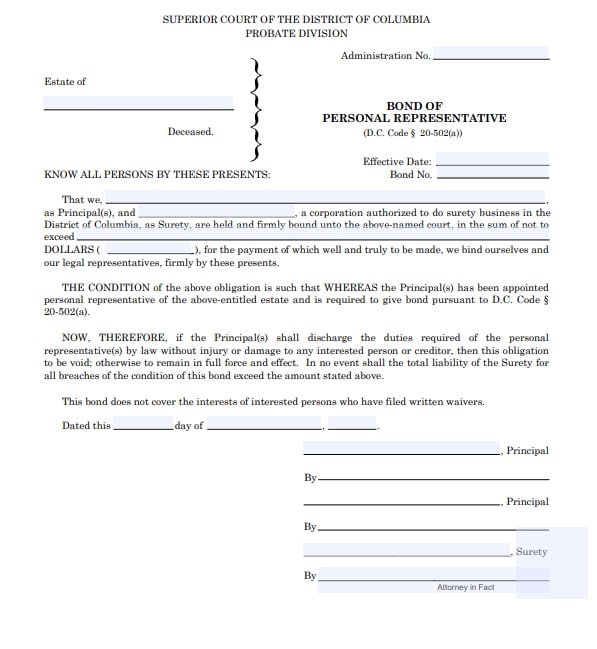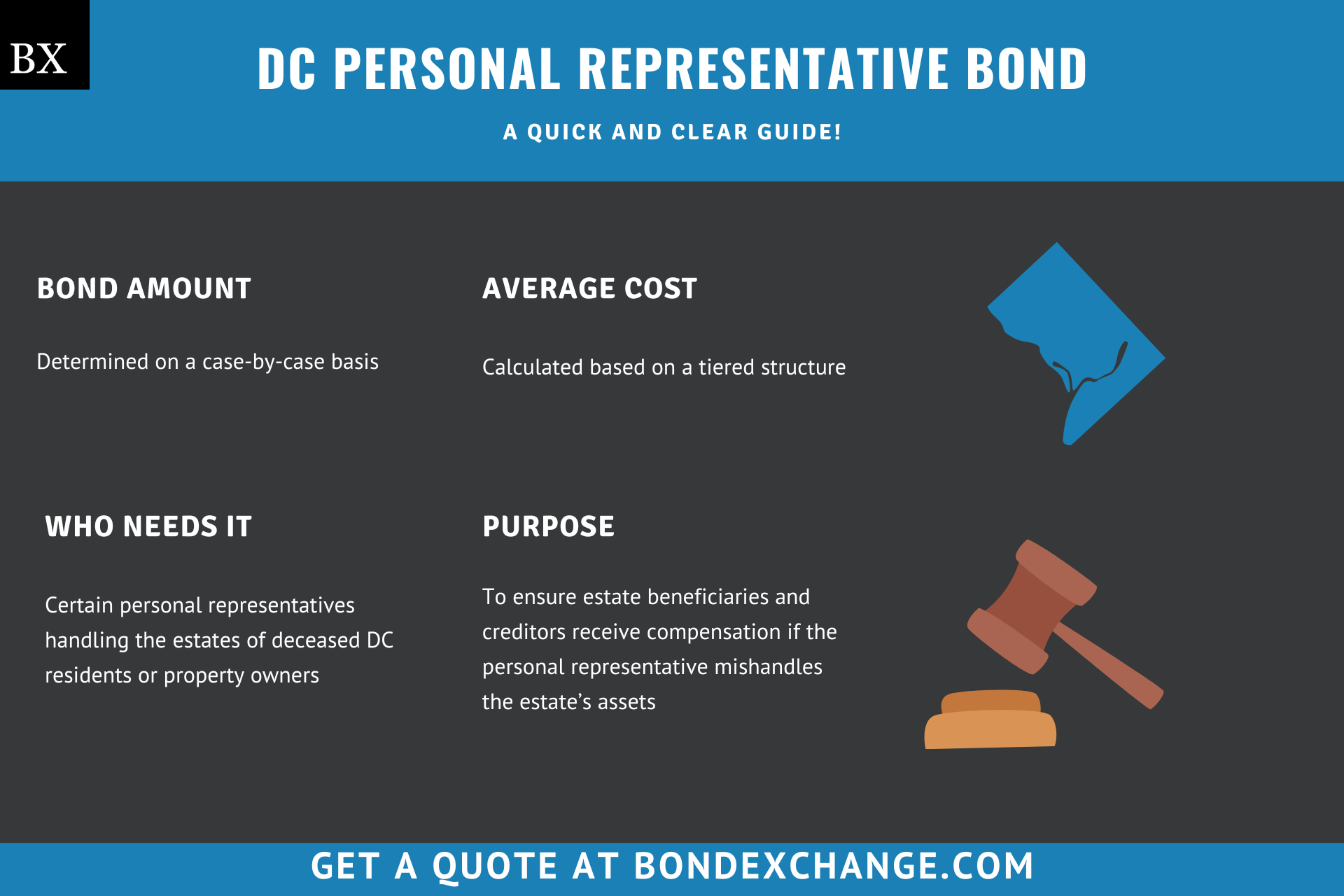DC Personal Representative Bond: A Comprehensive Guide
At a Glance:
- Average Cost: Calculated based on a tiered structure
- Bond Amount: Determined on a case-by-case basis (more on this later)
- Who Needs it: Certain personal representatives handling the estates of deceased DC residents or property owners
- Purpose: To ensure estate beneficiaries and creditors receive compensation if the personal representative mishandles the estate’s assets
- Who Regulates Personal Representatives in DC: The probate division of the Superior Court of the District of Columbia

Background
DC Code 20-501 et seq. requires all personal representatives of an estate to be appointed by a court before assuming their fiduciary duties. The DC Council enacted the appointment requirement to ensure that personal representatives do not mismanage the estate’s assets. To provide financial security for the enforcement of this requirement, the court may require the personal representative to purchase a probate surety bond to be eligible for appointment.
What is the Purpose of the DC Personal Representative Bond?
DC requires personal representatives to purchase a surety bond as a prerequisite to being appointed as a fiduciary over an estate’s assets. The bond ensures that the estate’s beneficiaries and creditors will receive compensation for financial harm if the personal representative fails to abide by the regulations outlined in DC Code 20-502. Specifically, the bond protects beneficiaries and creditors if the personal representative engages in any acts of fraud or mismanages the estate’s assets. In short, the bond is a type of insurance that protects the estate’s beneficiaries and creditors if the personal representative violates their fiduciary duties.
How Can an Insurance Agent Obtain a DC Personal Representative Surety Bond?
BondExchange makes obtaining a DC Personal Representative bond easy. Simply login to your account and use our keyword search to find the “Probate” bond in our database. Don’t have a login? Gain access now and let us help you satisfy your customers’ needs. Our friendly underwriting staff is available by phone (800) 438-1162, email or chat from 7:30 AM to 7:00 PM EST to assist you.
At BondExchange, our 40 years of experience, leading technology, and access to markets ensures that we have the knowledge and resources to provide your clients with fast and friendly service whether obtaining quotes or issuing bonds.
Not an agent? Then let us pair you with one!
Click the above image to find a BX Agent near you
How is the Bond Amount Determined?
DC Code 20-502 grants the court the authority to determine the bond amount on a case-by-case basis. However, the bond amount may not exceed the probable maximum value of the estate’s personal property and all real property (real estate) located in DC. The court may reduce the bond amount by the value of any property deposited with a bank or savings institution, as well as the value of any property that cannot be sold without court approval. The court may increase or decrease the required bond amount as they see fit as long as good cause is shown before doing so.
What are the Underwriting Requirements for the DC Personal Representative Bond?
Most surety companies will examine the following factors when determining eligibility for the DC Personal Representative bond:
- Personal representative’s credit history (not considered for bonds with limits less than $25,000)
- Whether or not the estate has an attorney (not considered for bonds with limits less than $25,000)
- How long the fiduciary appointment is for
- Whether or not the personal representative is replacing a prior fiduciary
- If the personal representative has ever committed a felony
- If there are disputes among the estate’s beneficiaries
- Whether or not there is any ongoing business in the estate
- If the bond is being required by a creditor
How Much Does the DC Personal Representative Bond Cost?
Surety companies typically determine the premium rate for personal representative bonds based on a tiered structure. As a result, larger bond amounts will be charged a lower premium rate than smaller bonds.
The following table illustrates the pricing structure for the DC Personal Representative bond:
$1,500,000 Personal Representative Bond Cost
| Bond Amount | Premium Rate | Total Bond Cost |
|---|---|---|
| First $20,000 | 0.75% | $150 |
| Next $40,000 | 0.60% | $240 |
| Next $140,000 | 0.50% | $700 |
| Next $300,000 | 0.375% | $1,125 |
| Next $1,000,000 | 0.25% | $2,500 |
| Total cost of $4,715 |
Who is Required to Purchase the DC Personal Representative Bond?
DC requires personal representatives to purchase a surety bond as a prerequisite to obtaining a fiduciary appointment. To paraphrase DC Code 20-101, a personal representative is a court-appointed fiduciary responsible for administering a deceased individual’s estate. Personal representatives are referred to as executors if the deceased individual nominated them in their will (testate), and administrators if they were not nominated if no will exists (intestate). Additionally, a special personal representative is someone temporarily appointed to administer the estate while a general personal representative is in the process of being appointed.
Personal representatives are not required to purchase a bond if:
- The will explicitly waives the bond requirement
- All estate beneficiaries agree to waive the bond requirement
- They are a bank or trust company
- All assets have been distributed and all claims have been paid
- The estate is subject to small estate administration
Any person with an interest of $1,000 or more in the estate may petition the court to require an exempt personal representative to purchase a bond. The court will hold a hearing to determine whether a bond should be required, and may not set the required amount to be more than the petitioner’s interest in the estate.

How do Personal Representatives Become Appointed in DC?
Personal representatives in DC must navigate several steps to become court-appointed fiduciaries. Below are the general guidelines, but applicants should refer to DC’s probate codes and the probate division of the District’s judicial website for details on the process.
Step 1 – Meet the Qualifications
Personal representatives are ineligible for appointment if they:
-
- File a written declaration with the Register renouncing their right to administer
- Are under the age of 18
- Have a mental illness as defined in DC Code 21-501 or are under a conservatorship
- If they have been convicted of a felony within the past 10 years and have not been pardoned
- Is not a lawful permanent resident
- Are a judge or employee of the judicial system (unless they are the surviving spouse or related to the deceased individual within the third degree
- Are a not a resident of DC (unless they file an irrevocable power of attorney with the Register)
Step 2 – Determine Priority
Priority for appointment as a personal representative is granted in the following order:
-
- Persons nominated in the will
- The surviving spouse or children of an intestate estate or the surviving spouse of a testate one
- Residuary legatees (persons entitled to unassigned property)
- The surviving children of a testate estate
- Grandchildren
- Parents
- Siblings
- Next of kin
- Any other relative
- The largest creditor to apply for appointment
- Any suitable person
The court may appoint a person with lesser priority if good cause is shown.
Step 3 – Hire an Attorney
Although not explicitly required, it is highly recommended that personal representatives hire an attorney to assist with the probate process.
Step 4 – Determine the Estate Administration Type
DC has three distinct estate administration types, as outlined below:
-
- Unsupervised Administration: The personal representative does not need to file inventories of the estate’s assets or accounts of their activities with the court and is able to administer the estate with minimal court supervision
- Supervised Administration: The personal representative must file inventories of the estate’s assets and accounts of their administration activities with the court and is subject to strict court supervision. Supervised administration is only commenced in the following instances:
- The deceased individual’s will requests it
- The court finds that supervised administration is neccessary to protect persons interested in the estate, even if the deceased individual’s will requests unsupervised administration
- Small Estate: Estates worth less than $40,000 are eligible for small estate administration, a far quicker process than unsupervised and supervised administration.
Step 5 – Contact the Superior Court
Personal representatives should contact the Probate Division of the Superior Court of the District of Columbia. A court representative will walk the personal representative through the appointment process, provide them with all required forms, and answer any questions they may have.
How do DC Personal Representatives File Their Bonds?
Personal representatives should submit their completed bond forms, including the power of attorney, to the office of the Register of the DC Superior Court.
The surety bond requires signatures from the company that issues the bond and the personal representative. The surety company should include the following information on the bond form:
- Name of the deceased individual
- Legal name of the entity/individual(s) buying the bond
- Surety company’s name
- Bond amount
- Date the bond is signed
What can DC Personal Representatives do to Avoid Claims Made Against Their Bonds?
To avoid claims against their bonds, personal representatives in DC must ensure that they:
- Do not mismanage the estate’s assets
- Properly distribute all property owed to estate beneficiaries and creditors
- Fulfill their fiduciary duties

